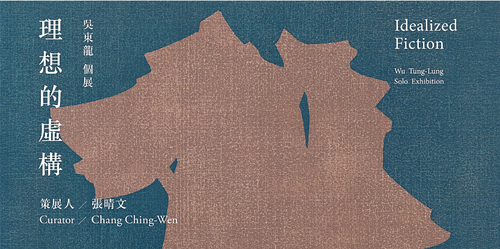Idealized Fiction - Wu Tung-Lung Solo Exhibition
10/31 (Sat) - 12/13/2015 (Sun)
Wu Tung-Lung

Dates: 2015.10.31-12.13
Venue: Double Square Gallery
Opening: 2015.10.31 SAT. 15:00
Guided Tour: 2015.11.07 SAT. 15:00 with Wu Tung-Lung
Artist Talk: 2015.11.28 SAT. 15:00 with Hsueh Pao-shia, Chang Ching-Wen, Wu Tung-Lung, Sean Hu
Guided Tour: 2015.12.06 SUN. 15:00 with Chang Ching-Wen, Wu Tung-Lung
“The inexpressible relationships of every stripe between the artist and the world lurk in the narratives woven by the artist himself. After all, everything is no fact but fiction.”—Chang Ching-Wen
Idealized Fiction—Wu Tung-Lung Solo Exhibition will take place on 31 October 2015, presenting a total of 18 latest works created by the artist this year. Curator Chang Ching-Wen is invited to organize this exhibition. Packed with literary allusions, this exhibition highlights the essence of fiction and the imagery of abstraction conveyed by Wu Tung-Lung’s riveting artworks. The title Idealized Fiction is derived from the allegorical scenario of Moriana described in Le Città Invisibili by the Italian writer Italo Calvino who was adept at depicting fictitious things with veracious words, while these fictitious things may faithfully reflect realities. So is the case of painting. The fictitious things that painters or writers create, quovis modo, tend to constitute an untrammeled scene, city, or world. Nonetheless, for these fantastic landscapes to take final shape, it further requires the engagement of the viewers or the readers with their vivid imagination. As far as the content of Wu’s paintings is concerned, all the lines and symbols are not created for referring to any specific things. They are as fictional as the elements in novels. However, the viewers cannot refrain from relating themselves to these fictional things in some way. For the artist, these fictional things may be the metaphorical expressions of his life condition. They are created by the artist’s meticulous craftsmanship and ingenious scheme without losing their aesthetically lithe grace.
Wu’s works explore the symbolic presentation of organic shapes and the rhythmic arrangement of geometric lines. He has built his unique creative vocabulary and style by ingeniously applying various artistic elements such as linearity, color blocks, volumes, and spaces. All the monochromatic imprimatura, geometric patterns, and minimalist lines and graphics in his works constitute the abstract yet riveting landscapes in pulsatile rhythms. The curator Chang Ching-Wen argues that the primary accordance for an abstract painter is perhaps his innermost self. The innermost self is also the basis for Wu to tackle his relationship to the external world. With a subtle touch of mystery, the artist successfully demonstrates practiced skills and surgical precision in his ambiguous and fascinating works by his insistence upon strict procedure, perfect composition, and figurative vocabulary.
In terms of painting technique, the artist neither covers the canvas with layers of intense colors, nor mixes different colors in the strokes. Rather, he removes or ameliorates the artificial painterliness in his works with mechanical back-and-forth brushstrokes. Finally, he gives prominence to the hand-painted texture with quasi-horizontal or daubing strokes, creating dramatic tension and a sense of volume on the seemingly flimsy surface. He creates the experience of simple and elegant colors by presenting the levels of monochromatic imprimatura and the infiltration of different hues of cool colors on the canvas processed under established and complex procedures.
Born in Taipei, 1976, Wu Tung-Lung earned his master’s degree from the Graduate Institute of Plastic Arts, Tainan National College of the Arts. He works in fine art creativity all these years. He was an artist-in-residence in New York, Aberdeen, and Paris. His works are collected by Taipei Fine Arts Museum, National Taiwan Museum of Fine Arts and the Ministry of Culture, and has been exhibited in Paris, Scotland, Beijing, Gwangju, and Singapore.
Chang Ching-Wen is an art critic and a curator. She earned her doctoral degree from the Graduate School of Art Management and Culture Policy, National Taiwan University of Arts, and teaches as an assistant professor in the Department of Arts and Design, National Hsinchu University of Education. She used to be the executive editor of Artist. Her recent curatorial works include Future Flash Fiction (2015) and Art as Social Interaction - Hong Kong/Taiwan Exchange (2014).